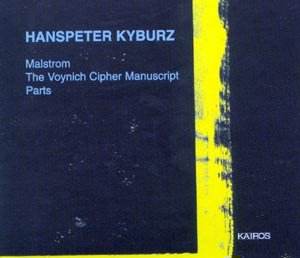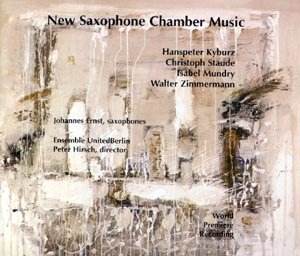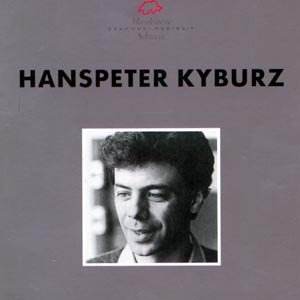Hanspeter KYBURZ
Malstrom SWR-SO Baden-Baden & Freiburg/Zender;
The Voynich Cipher Manuscript Sudfunk-Chor Stuttgart/Klangforum
Wien/Huber;
Parts Klangforum Wien/Rundel
 Kairos 0012152K [59
mins]
(PGW)
Kairos 0012152K [59
mins]
(PGW)
Kairos

New Saxophone Chamber Music
Hanspeter KYBURZ Cells
Christoph STAUDE Obduktion
Isabel MUNDY Composition for
saxophone & tape
Walter ZIMMERMANN Fragmente der Liebe
 Ensemble
UnitedBerlin/Hirsch with Johannes Ernst (saxophones)
Ensemble
UnitedBerlin/Hirsch with Johannes Ernst (saxophones)
 Col legno wwe 31890 [71
min] (PGW)
Col legno wwe 31890 [71
min] (PGW)
Col legno

Hanspeter KYBURZ
Parts Klangforum Wien/Rundel
The Voynich Cipher Manuscript Sudfunk-Chor Stuttgart/Klangforum
Wien/Huber
Cells Klangforum Wien/Rundel with Marcus Weiss
(saxophones)
 Grammont Portrait MGB CTS-M
52 [68 mins] (PGW)
Grammont Portrait MGB CTS-M
52 [68 mins] (PGW)
There is a purchasing link at
Klangforum

I remain haunted by Hanspeter Kyburz (b. 1960), little known in UK
yet although widely performed in Europe, whose Cells for saxophones
& large chamber orchestra, was heard in a
London
Sinfonietta concert at South Bank Centre, when
S&H's Jean Martin provided
fuller background about Kyburz & Cells:
Hanspeter Kyburz is very much interested in the idea that small causes lead
to unpredictable results, unpredictable because too many variables are involved,
e.g. the famous stroke of a butterfly which eventually causes a storm on
the other side of the globe.
Kyburz uses a computer to develop and test compositional scenarios. After
he has made an aesthetic or musical decision - the computer algorithms mere
tools - he transcribes the results into conventional notation for traditional
instruments.
Kyburz has said: "I use the computer in a dialogical way. I translate
my musical imagination into instructions for the computer and then listen
to the result. Thus I can experience whether the result can match
my imagination. Sometimes I am disappointed to find that I could only grasp
rationally a very small part of the requirements, the instructions for the
computer are too reduced and the result doesn't live upto my expectations.
On the other hand I get surprised by the computer, because unexpected
consequences in complex processes can stimulate my imagination again. It
is a dialogue: I can correct myself, and I love to be surprised by the computer."
In listening to this complex and surprising piece one can sense the intellectual
vigour applied in the composition process, even though there is far too much
to grasp on first hearing. There seem to be similarities with the way that
Magnus Lindberg, now well established and regularly played in UK, also works.
Its success should encourage further exploration here of Hanspeter Kyburz's
oeuvre.
See also Munich Festival
review
There are two recordings of Cells, one also including these same
performances of The Voynich Cipher Manuscript and of Parts,
the other a highly desirable collection of New Saxophone Chamber Music by
various composers (col legno wwe 31890). I described Cells as enveloping
us for nearly half an hour in a multiplicity of ideas and swirling sounds,
the soloist impressive in deploying saxophones of all sizes in the midst
of the maelstrom.
That last is the title of the most recent work in the present release,
Malstrom (1998) for large orchestra in four groups, based on an E
APoe narration of 1841. The same complexity and the exilaration and excitement
engendered by Cells is evident here too.Hans-Peter Jahn, artistic
director of the admirable Stuttgart Festival (to which S&H intends
to return in February), writes of its rotating centrifugal force and 'ecstatic
giddiness' becoming addictive. Do not be put off by the underlying theoretical
structure and Kyburz's use of computers to mediate his intention and rich
imagination.
If you have enjoyed
Lindberg
, who also makes good use of computer technology in getting his notes
down onto paper, you will respond to the physicality of Kyburz's
Malstrom and Parts (1995) for chamber orchestra,
the notable Klangforum of Vienna.
The Voynich Cipher Manuscript derives from Kyburz's preoccupation with a
secret script which has eluded all attempts at deciphering it (or, in
consequence, pronunciation!) since the 16th Century, when the manuscript
was sold for astronomical prices as supposedly containing the 'elixir of
life'. Kyburz sets rows of numbers deriving from scholarly attempts to crack
the code, and poems in a futuristic-archaistic 'star language' by Chlebnikov
(given in German only). Quite easy, really? It is a typically avant-garde
collage of choral and instrumental music, at one fascinating for its sheer
sound and, inevitably and no doubt designedly, perplexing.
The New Saxophone Chamber Music CD gives a fine conspectus of this
versatile instrument in a variety of contexts. Apart from the Kyburz, of
which much above, I enjoyed particularly the Zimmermann Fragments of
Love with string quartet.
I would recommend adventurous purchasers to go for this one and the new
Kairos, both of which are well recorded and expertly played, with
useful supportive written material; the Grammont may be harder to locate.
Peter Grahame Woolf

